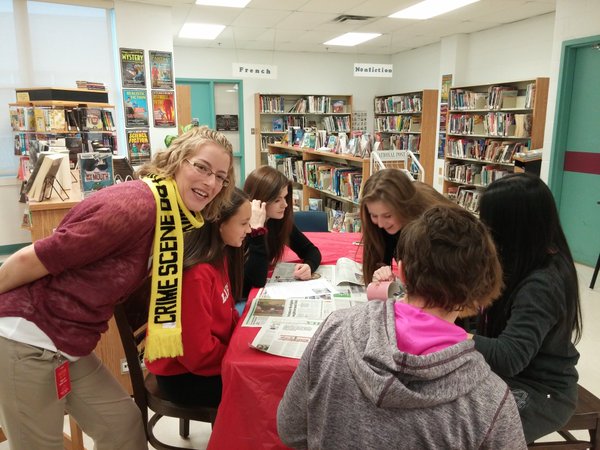I attended junior high in Yellowknife, which is not the most isolated place in Canada, but definitely felt like it sometimes. Fortunately, the school library was huge, and offered a portal to endless worlds I couldn’t visit in the flesh.
And then there was the time Sheree Fitch came to visit.
To this day, I vividly remember watching in awe as she recited parts of her work-in-progress to us – a work that later became There Were Monkeys in My Kitchen. It was the first time I’d really understood that the books I loved were written by actual human beings. From there, it was a very short leap to the notion that I could write books, too.
I was thinking about that moment yesterday as I stood in the library of Ridgecliff Middle School, waiting for the first class of grade 7s to file in for their author visit. I was also thinking, I am the author they are coming to see. How weird and awesome is that? And what an incredible gift, to be given the opportunity to inspire a child the way I was inspired so long ago.
 After four back-to-back renditions of my Forensic Science: Digging Into DNA presentation, I finished the day both exhausted and exhilarated. The kids were alert and engaged, asking great questions. When I told them that Alec Jeffreys, who discovered DNA fingerprinting, simulated crime scene stains by cutting himself and smearing his own blood around the lab for later testing, they were so caught up in discussing his scientific bad-assery, I had a hard time reigning them back in for the rest of the talk.
After four back-to-back renditions of my Forensic Science: Digging Into DNA presentation, I finished the day both exhausted and exhilarated. The kids were alert and engaged, asking great questions. When I told them that Alec Jeffreys, who discovered DNA fingerprinting, simulated crime scene stains by cutting himself and smearing his own blood around the lab for later testing, they were so caught up in discussing his scientific bad-assery, I had a hard time reigning them back in for the rest of the talk.
The librarian said she’d never seen the students so excited about an author visit. While I’d love to take the credit for that, the real reason for their response wasn’t me – it was the science. Because science, as all Sci/Why readers know, is COOL.
Teacher and librarian friends, if you haven’t considered bringing a science writer in to talk to your classes, here are my favourite reasons why you should think about it next time you book guest speakers:
- Science is cool (bears repeating!)
- Kids who say they don’t like to read might just be kids who don’t like fiction. Once those kids discover fact-based books, however, they can become some of the most avid readers around
- Science writers support both the Language Arts curriculum (because writing), and the science curriculum, making them a great bargain – two for the price of one!
- We can talk about research skills, too.
- With small classes, we can lead experiments
- Like any author, we can inspire kids to think about becoming writers. But the topics we present might also inspire them to become scientists. And how great would that be?
Check your provincial Writers in the Schools program, the CCBC Author Directory, or the Writer’s Union’s National Public Reading Program for listings of science writers who do presentations. If you can’t afford speaking fees, most authors will be able to direct you to funding sources that will cover the cost of bringing a guest speaker into the classroom or library.
Your turn, fellow science writers – what great experiences have you had giving school presentations? Teachers and librarians, have you ever booked a science writer for a presentation? What impact did you notice on the kids?
—
My forensics presentation is based on two of my books for junior high and high school readers – Forensic Science: In Pursuit of Justice, and Fuzzy Forensics: DNA Fingerprinting Gets Wild. I’m currently offering deep discounts on first-edition copies of Fuzzy Forensics for educational use. Contact me for details.